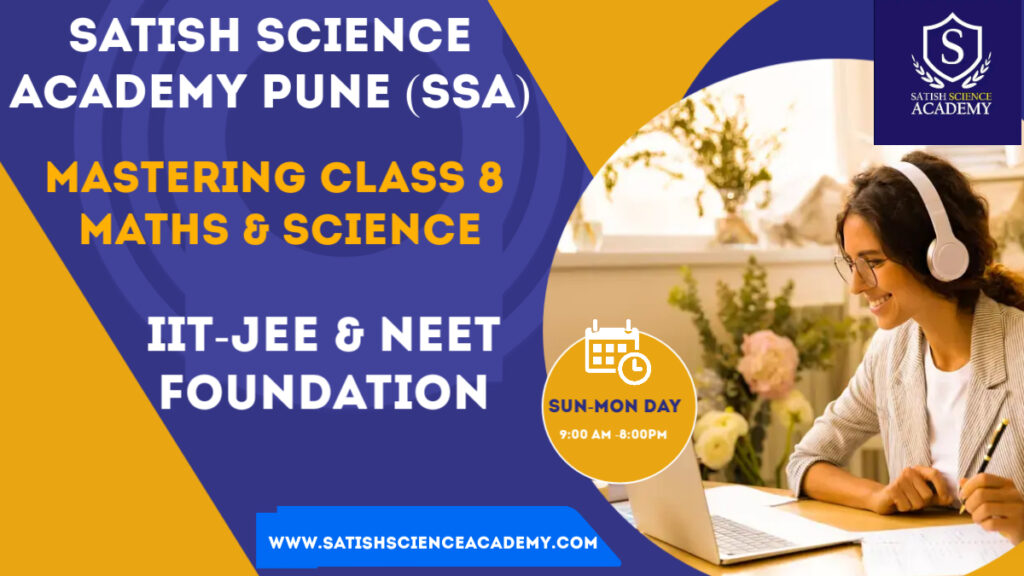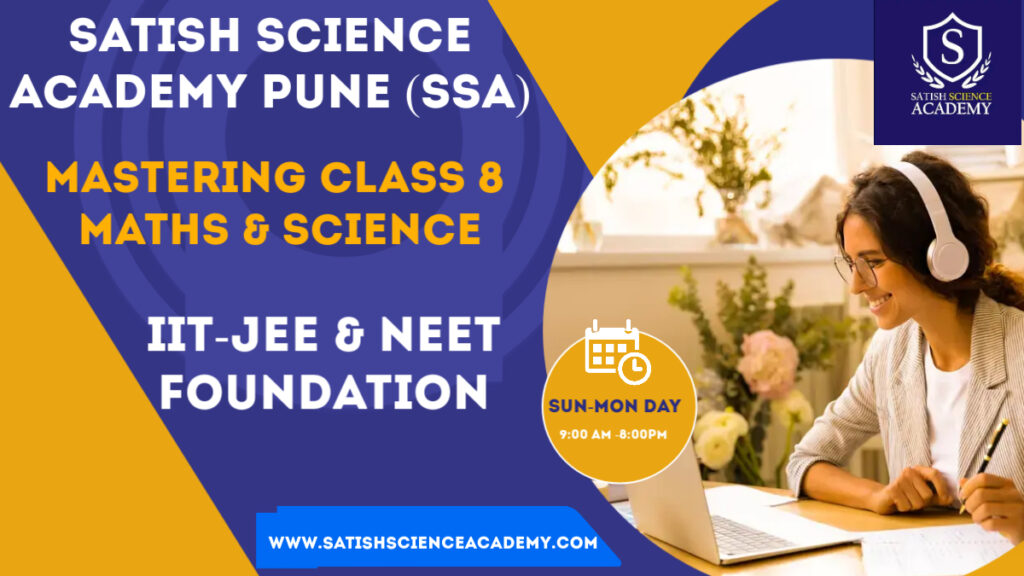Class 8 Maths & Science: Foundation for IIT and Future Success
1.Introduction
Class 8 Maths & Science serves as a turning point in a student’s academic journey, especially in core subjects like Mathematics and Science. It marks the transition from foundational learning to more structured and conceptual understanding, which is vital for tackling complex topics in higher classes. More importantly, this stage plays a crucial role in shaping logical reasoning, analytical thinking, and problem-solving abilities—skills that are indispensable for competitive exams such as IIT-JEE, NEET, NTSE, and various Olympiads.

A strong command over Class 8 Maths and Science helps students build confidence as they explore topics like algebra, geometry, force, pressure, sound, chemical reactions, and more. These concepts act as the building blocks for the advanced chapters introduced in Classes 9 to 12. If a student develops conceptual clarity and practice discipline in Class 8, they will find the later academic challenges more manageable.
In this blog, we will delve into the complete Class 8 Maths and Science syllabus, suggest smart study techniques, highlight top resources (books, apps, and online platforms), and explain . Whether your goal is to excel in board exams or crack national-level competitions, Class 8 is where your preparation truly begins.
. Understanding the Class 8 Maths Syllabus
Class 8 Maths & Science As students step into Class 8th Maths, they experience a significant shift from mechanical problem-solving to conceptual understanding. The subject begins to demand logical reasoning, abstract thinking, and analytical skills. It is no longer about just following steps — students are expected to understand why those steps work. This not only helps in academics but also prepares the groundwork for competitive exams like IIT-JEE, NTSE, Olympiads, and even real-world problem-solving.
Let’s explore the major topics in Class 8th Maths:
Important Topics in Class 8th Maths
- Rational Numbers
Students learn to operate with positive and negative rational numbers, understand properties like closure, associativity, and distributivity, and solve expressions involving all four basic operations. - Linear Equations in One Variable
These are the stepping stones for algebra. Students solve equations involving variables on both sides, learn to handle brackets, and apply them to real-life word problems. - Understanding Quadrilaterals
The concept of polygons, especially quadrilaterals and their properties, is introduced. It helps develop geometric reasoning, which is useful in higher geometry. - Algebraic Expressions and Identities
One of the most critical chapters, it introduces monomials, binomials, and polynomials, along with algebraic identities used extensively in higher classes and exams like IIT-JEE. - Factorisation
Students learn how to break down algebraic expressions into factors, an essential skill that finds applications in calculus and equation solving in higher grades. - Mensuration
Covers surface area and volume of solids like cubes, cuboids, and cylinders, helping students visualize 3D objects and apply formulas accurately. - Exponents and Powers
This chapter strengthens the understanding of powers, especially negative and scientific notation, used in physics and chemistry later. - Direct and Inverse Proportion
The real-life application of ratios is explored here. Students learn to analyze relationships and solve problems based on proportional reasoning. - Introduction to Graphs
Students are introduced to plotting points, linear graphs, and interpreting data using graphs—essential for subjects like Physics, Statistics, and Economics. - Data Handling and Probability
Covers collection, representation, and interpretation of data along with basic probability—concepts that form the base for Statistics and Data Science.
Why Conceptual Clarity in Class 8th Maths Matters
Class 8 Maths & Science ,a solid grip over Class 8th Maths boosts a student’s ability to solve multi-step problems, understand patterns, and think logically. These skills are not only vital for academic excellence but also critical for success in competitive exams. Students who grasp these topics well are better prepared to tackle high school Maths with confidence and accuracy.
Board-Specific Approach: CBSE, ICSE, and State Boards
The core topics in Class 8 Maths & Science remain largely consistent across various boards, but there are key differences in approach and depth:
- CBSE Board:
The examples and exercises are structured to build a strong logical base. CBSE also integrates interdisciplinary thinking, especially useful for Science and Technology applications. - ICSE Board:
The Indian Certificate of Secondary Education (ICSE) includes a more detailed and problem-intensive curriculum. Students solve more word problems, deal with extended applications of algebra and geometry, and often use reference books in addition to textbooks. - State Boards:
Each state board customizes content with local language support and region-specific examples. While the basic structure is similar, the depth and presentation vary. Some boards may emphasize real-life applications more than abstract thinking, depending on regional education policies.
Final Thoughts: Class 8th Math’s & Science as a Launchpad
Mastering Class 8th Maths and Science is not just about passing the year—it’s about building a mindset ready for high school and beyond. These subjects sharpen analytical skills, improve accuracy, and develop the curiosity to question and explore. Whether your child aims for IIT-JEE, NEET, Olympiads, or simply wants to excel academically, Class 8 Maths & Science is where it all begins.
In upcoming sections, we’ll explore the Class 8 Maths & Science syllabus, top study strategies, and expert resources to guide students toward academic excellence.
2. Class 8 Science Syllabus Overview
Success in Class 8th Maths and Science is not just about studying harder—it’s about studying smarter. With the right approach, students can grasp complex concepts, retain them longer, and apply them confidently in both exams and real-life situations. Here are some effective strategies to help students master these subjects with ease:
. Build Strong Conceptual Clarity
In Class 8th Maths and Science, every new topic builds on previously learned concepts. Whether it’s solving linear equations or understanding chemical reactions, clarity is key. Students should aim to understand why a concept works instead of just memorizing formulas or facts.
. Follow a Chapter-Wise Schedule
Class 8 Maths & Science Break the syllabus down into manageable sections and create a weekly timetable.
Example Plan:
- Monday & Wednesday – Class 8th Maths (Algebra, Geometry)
- Tuesday & Thursday – Class 8th Science (Physics or Chemistry)
- Friday – Revision or Practice Test
- Saturday – Concept recap + doubt clearing
- Sunday – Mock test or NCERT exemplar questions
. Practice Daily – Especially in Maths
Maths is a subject that demands consistent practice. The more problems students solve, the better they understand patterns and techniques.
Focus Areas in Class 8 Maths & Science:
- Algebraic Expressions
- Factorisation
- Mensuration
- Graphs and Data Handling
Tip:
Maintain a separate notebook for formulas and solved examples to revise quickly before exams.
Perform Simple Experiments at Home (Science)
For Class 8 Maths & Science, try performing safe, simple experiments at home to visualize key concepts—like making a periscope for light reflection or testing friction using various surfaces.
This not only enhances understanding but also boosts interest in scientific thinking.
Use NCERT & Supplementary Resources
For CBSE students, the NCERT textbooks are the gold standard. But to deepen understanding and prepare for Olympiads or school-level tests, students can also refer to:
- RD Sharma (for Maths) Satish science academy course
- Lakhmir Singh & Manjit Kaur (for Science)
- MTG Foundation Books
- BYJU’S, Vedantu, or Khan Academy videos for visual learners
Make Summary Notes and Flashcards
Class 8 Maths & Science ,After completing each chapter, make short notes of key points, formulas, definitions, and laws. Flashcards are especially helpful in Biology for remembering cell parts, diseases, or classification systems.
Solve Previous Year Questions & Practice Worksheets
Regularly solving previous year questions and practice worksheets will:
- Strengthen retention
- Help identify weak areas
- Familiarize students with exam patterns
Tip:
Use school question papers or mock test series available online or in coaching institutes like Satish Science Academy.
Revise Regularly
Revision is the backbone of success in Class 8th Maths and Science. Schedule regular revision sessions every weekend to go over difficult topics and strengthen memory.
Focus on Diagrams and Labeling (Biology & Physics)
Well-labeled diagrams are scoring elements in Science. Practice drawing:
- The human cell structure
- Reflection and refraction of light
- Electric circuits
- Crop cycle and microorganisms
These visuals improve your understanding and boost marks in exams.
Stay Curious & Ask Questions
Encourage students to ask questions—why does friction happen? How does sound travel? What causes chemical changes? Curiosity leads to a deeper grasp of science and helps develop lifelong learning habits.
With regular practice, the right resources, and a positive mindset, students can master Class 8th Maths and Science effectively. The habits developed now will carry forward into higher classes and prepare them for success in board exams and competitive entrances.
3. IIT Foundation for Class 8: Why Start Early?
Class 8 Maths & Science starting IIT Foundation in Class 8 gives students a significant edge. It develops analytical thinking and improves problem-solving skills beyond the school curriculum.

Benefits:
- Early exposure to higher-level concepts in Maths & Science
- Builds logical reasoning and aptitude
- Better performance in school and Olympiads
Key IIT Foundation Topics Introduced in Class 8:
- Algebra and Number Theory
- Geometry and Mensuration (Advanced Level)
- Speed, Distance, Time Problems
- Atoms, Molecules, and Laws of Motion
4. Best Study Strategy for Class 8 Maths & Science
Daily Routine:
- Allocate 2 hours daily: 1 hour for Maths, 1 hour for Science
- Divide weekly targets into chapters and topics
- Regular revision with concept maps and summary notes
How to Balance School and IIT Foundation:
- Study NCERT or Board textbooks for school preparation
- Use Foundation books for advanced learning
- Weekly assessments to track progress
Concept Clarity vs. Rote Learning: Understanding the ‘why’ behind every formula and experiment is essential. Encourage hands-on activities, lab experiments, and application-based questions.
5. Top Books and Resources forClass 8 Maths & Science
Maths:
- NCERT Class 8 Maths Book
- R.D. Sharma for problem-solving
- Foundation books from MTG, Pearson, and Arihant
- Satish science academy note for Class 8 Maths & Science
Science:
- NCERT Class 8 Science Book
- Lakhmir Singh & Manjit Kaur Science Series
- Olympiad preparation books
- Satish science academy note for Class 8 Maths & Science
Reference for IIT Foundation:
- MTG Foundation Course for Class 8
- Arihant Foundation Course
- Pearson IIT Foundation Series
- Satish science academy note for Class 8 Maths & Science
6. Digital Tools and Online Support
With the rise of e-learning, many apps and websites offer excellent learning support for Class 8 Maths & Science.
Top Apps:
- DIKSHA (by Government of India)
- BYJU’S
- Khan Academy
- SSA ,Satish Science Academy App (for IIT & NEET Foundation)
7. How to Develop Problem-Solving Skills forSatish science academy note for Class 8 Maths & Science
Tips for Maths:
- Solve different types of questions on the same concept
- Understand application-based and word problems
- Maintain an error log for mistakes and learn from them
Tips for Science:
- Visualize concepts using diagrams and animations
- Relate experiments to real-life examples
- Conduct home experiments under supervision
Time Management:
- Prioritize difficult topics
- Avoid last-minute cramming
- Practice previous year papers and sample tests
8. Why Class 8 is Crucial for IIT-JEE & NEET Foundation

Early Foundation Advantages:
- Strengthens base in Physics, Chemistry, Maths, and Biology
- Improves problem-solving and time management
- Identifies student interest and strength areas early
Exposure to Competitive Exams:
- NTSE (National Talent Search Examination)
- Olympiads (NSO, IMO, NSTSE)
- PRMO (Pre-Regional Mathematical Olympiad)
Building Confidence: Students who start early have a calm and confident approach towards tough exams, having already faced similar challenges.
9. Tips for Parents to Support Class 8 Students
- Create a quiet, well-lit study space
- Be involved but avoid micromanagement
- Encourage regular study habits and reading
- Reward effort over result
- Choose the right coaching or foundation program if needed
How to Identify the Right Institute:
- Check for faculty experience
- Look at student reviews and results
- Ask for demo sessions and curriculum overview

FAQs on Class 8 Maths & Science
1. Why is Class 8th Maths and Science important for IIT foundation?
Class 8th Maths and Science lay the groundwork for conceptual clarity. Topics introduced in this grade are foundational for JEE-level Physics, Chemistry, and Mathematics, making early preparation critical.
2. Can Class 8 students start preparing for IIT JEE?
Yes, beginning IIT preparation in Class 8 helps students develop a strong conceptual base, logical thinking, and time management skills, all of which are essential for cracking JEE.
3. What topics in Class 8th Maths are crucial for future IIT preparation?
Key topics like Algebra, Linear Equations, Geometry, Exponents, and Data Handling are fundamental. These concepts reappear in advanced forms in higher classes and JEE syllabi.
4. Which Class 8th Science chapters are linked with IIT foundation?
Chapters like Force and Pressure, Friction, Sound, Light, Synthetic Fibres, and Crop Production introduce scientific principles that evolve into Physics, Chemistry, and Biology topics for JEE/NEET.
5. How to make Class 8th Maths and Science fun and engaging?
Use visual aids, interactive apps, experiment kits, and real-life problem-solving activities.
6. Should students join coaching for Class 8th Maths and Science foundation?
Joining a foundation course or coaching helps build discipline, provides expert guidance, and exposes students to competitive-level questions early in their academic journey.
7. What is the ideal daily routine for mastering Class 8th Maths and Science?
Allocate 1–2 hours daily. Divide time between theory, problem-solving, revision, and mock tests. Weekly assessments help track progress and identify weak areas.
8. What books should students refer to for Class 8th Maths and Science foundation?
Apart from NCERT, books like R.D. Sharma, Lakhmir Singh & Manjit Kaur, and IIT Foundation Series by Pearson or MTG are excellent for strengthening Class 8th concepts.
9. How can parents support their child’s learning in Class 8th Maths and Science?
Parents should encourage regular study habits, provide access to good resources, and maintain open communication with teachers or tutors to track academic progress.
10. Are Olympiads beneficial for Class 8th Maths and Science preparation?
Absolutely. Olympiads like NSO, IMO, and NSTSE enhance analytical skills and expose students to advanced questions that prepare them for competitive exams like IIT-JEE.
11. How does learning Class 8th Maths and Science early help in career selection?
It opens up STEM career paths by fostering critical thinking and scientific temperament. Early interest often leads to a passion for engineering, research, or medicine.
12. Can online classes help in learning Class 8th Maths and Science effectively?
Yes, quality online platforms offer live classes, recorded lectures, and interactive tests tailored for Class 8th Maths and Science, allowing flexible and effective learning.
13. How to identify a good Class 8th Maths and Science tutor or coaching center?
Look for experienced faculty, a structured curriculum, regular assessments, performance tracking, and student reviews. A strong track record in foundation training is a bonus.
14. What role do practicals and experiments play in Class 8th Science?
Practicals deepen understanding by demonstrating scientific principles in real-time. Activities involving light, sound, or chemical reactions build curiosity and reinforce learning.
15. What is the best way to revise Class 8th Maths and Science before exams?
Create summary notes, use mind maps, solve previous years’ papers, and take timed mock tests.







